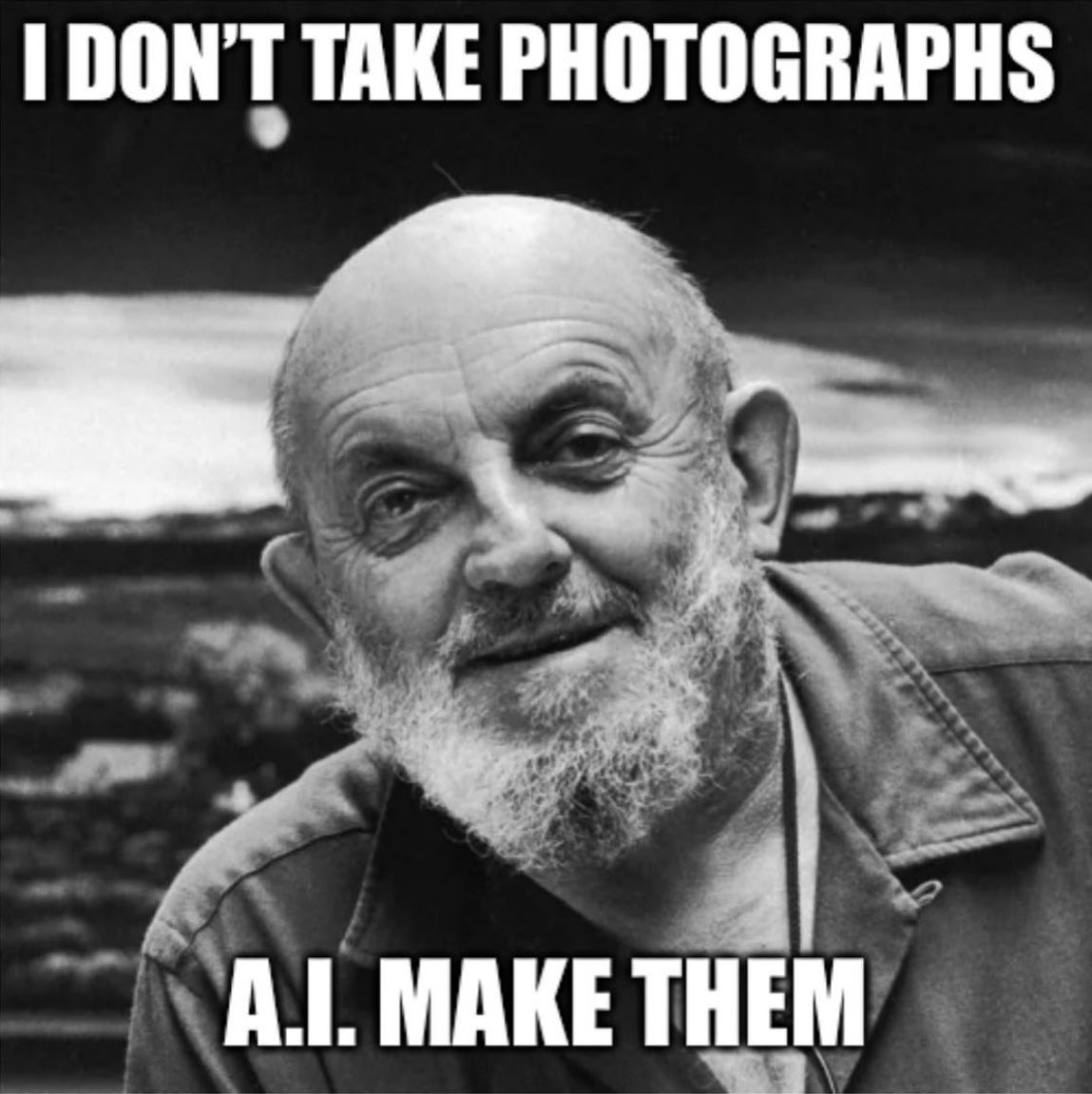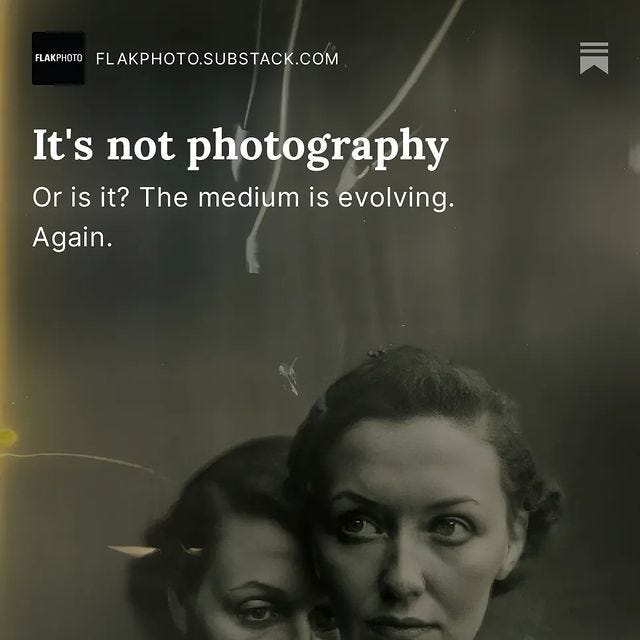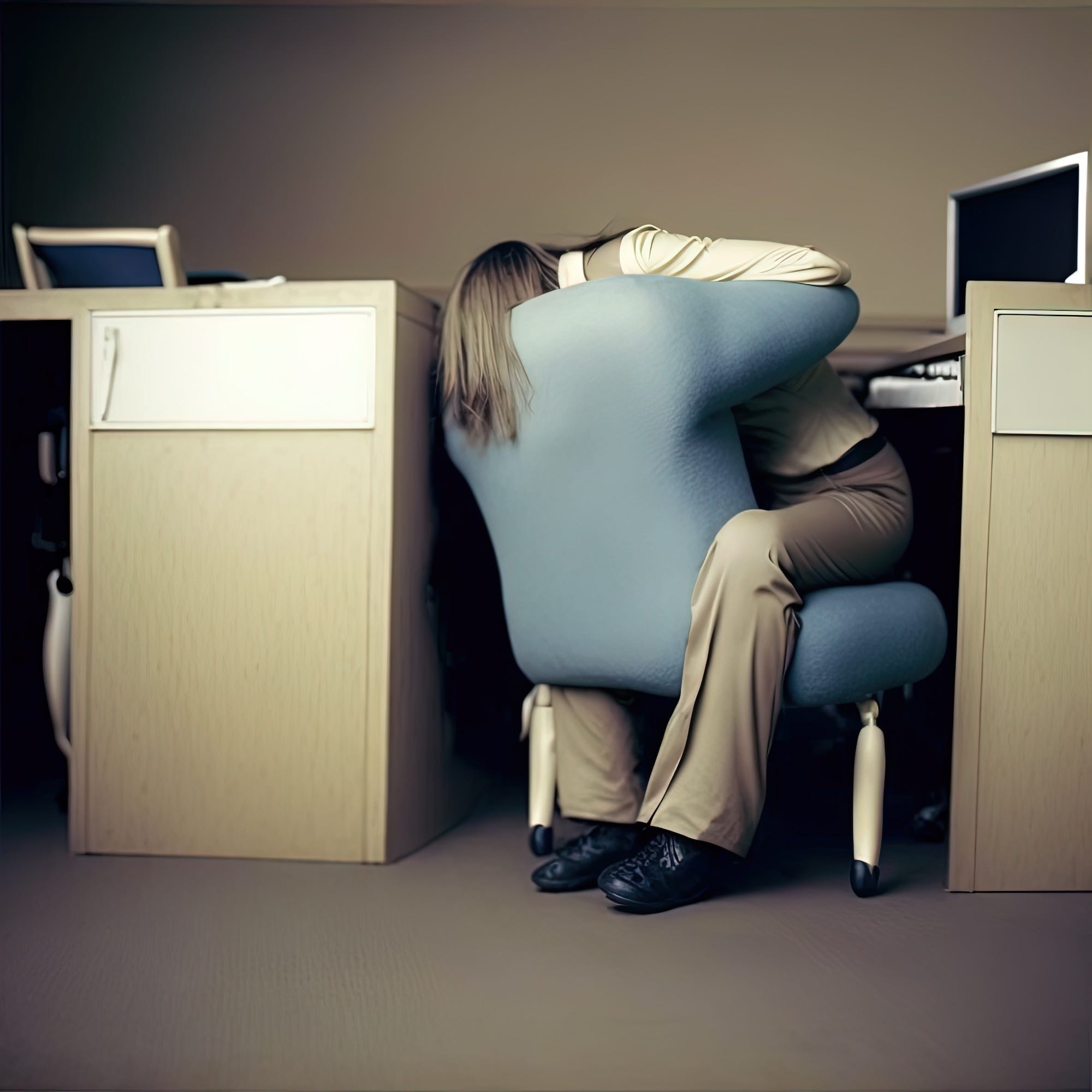Thanks, everyone, for the great feedback on my AI-generated imagery post this week. Part of why I write these things is to help me understand something I’m exploring. Thinking in public is a risky business. For better or worse, I’ve been doing that with FlakPhoto for the past 17 years. It usually pays off mainly because thoughtful people come out of the woodwork to share their insights and opinions with me.
This is one of the reasons I love writing here — my newsletter is a place to work through my ideas, but even more so, Substack provides an elegant home for discussing the things I write about. I'm still learning the platform and figuring out how to do my thing. Experiences like this make me feel I'm on the right track. Please read the piece if you have not seen it and are interested in the AI photography discussion. If the urge strikes, share it with your photography friends.
Letters to the Editor
My readers are the best. I like writing FlakPhoto Digest, but love reading my readers' comments. This post has been viewed nearly 30k times, and the response has been genuinely inspiring. So many thoughtful insights! This is why I ask questions — it’s fun to hear what people think, and there are always surprising responses.
To begin with, Colin Pantall sent this genius video. I don’t know about you, but I needed this. Thanks, Colin!
I have always believed that social media’s greatest potential was as a tool for collaboratively learning about photography. Many of you put forth thoughtful, critical reactions to the ideas I outlined in my post, and I want to share some of the highlights. Below are some of the ideas people shared over the past few days…
I realize AI is a new thing, but is it really? Are we not talking about pressing the 'enhance' button on our digital camera, 'add effect' on the laptop, etc.? Is this not already a series of processes to take a photograph and change it to something different? There are, of course, degrees of change, but how many times have we not seen competitions won or lost by people who have merged images or artificially improved in some sense using technology? I think we are long past the split in the family tree. Analog to the left, digital to the right. Perhaps this is just digital splitting again into 'AI digital' and 'pure digital” — Soren K. Harbel
Film photography is a chemical accident, and digital photography replicates that with electrons. There is no art implied there, only documentation. The art is in the application. The chemical process of scribing light to film is unlikely to produce a masterpiece on its own. Likewise, AI on its own is unlikely to produce a masterpiece. Both, guided by some human creative determination, have a chance. — Gary Zorko
Photography is at an inflection point. The original democratic medium, like democratic society, can go in any direction, not all of them socially beneficial. And when there is no trust, there is anarchy (or worse). As [Fred] Ritchin points out, there is still a role for photography in building social trust, but only if we rethink how to do that. — Marshall Mayer
People gripe about Instagram, but it’s still an excellent place for asking and answering questions. Many of you responded to my post there too. I’ve highlighted some of the insights that bubbled up below. You can read all 120+ comments here:
The first time I played with Midjourney, I thought, “This is like a camera that I can point right into my brain!” — Hannah Lynch
The art world’s reductive and boring attitude towards AI is disappointing yet predictable as incumbents feel threatened in various ways. Almost anything tangentially related to the tech sector—whether AI or NFTs—has been made a “culture war” divide to the detriment of opportunities to expand our understanding of how photography might exist and be understood in a purely digital context. The staunch “this isn’t photography” position feels reminiscent of the same old guard that proclaimed film the only legitimate form of photography. — Matthew Brooks
Photography has always been a medium that documents the present at the time it was taken. Ask AI to photograph your wedding. Ask AI to photograph your hometown. People are comparing AI changing photography to digital sensors changing photography...come on. When digital recording began to overtake magnetic sound recording, music was still music. When television, a completely new medium, came along, radio adapted and changed. Like television to radio, AI is a completely different medium from photography, with different purposes. AI images are not a new tool for photographers, but they literally replace your need in specific scenarios. A better question to ask is, in what way will this affect photographers, specifically commercial photographers? How will photographers adapt to this new medium? Unfortunately, AI images do look a lot like photographs, which complicates things. — Chris Franz
I believe it’s art, however you want to term it — digital art, artificial art, etc. — but just as painting and photography are different but equally important, I believe these are simply different genres. Photography, at its core, is beautiful because it shows your interpretation of the real world, of the way you see. This is the opposite of AI images, which capture what you think. — Harry Skeggs

I wrote about this on Facebook too. I think Roz Leibowitz, an artist friend, and always eloquent thinker, put it best:
As I continue to think about this after reading many, many posts, I realize we are asking the wrong question. Perhaps we should cut to the chase and simply ask, “Why do we care so much whether AI images are called photography?” Then we can dig into the issues of personal and professional identity that seem to be driving these conversations. And fear keeps rearing its head; the very real fear that jobs will be lost and the existential fear that there are barbarians at the gates waiting to get into the circle of those called “photographers.” I think both are valid concerns, the second the most important. I say let the conversations play out while living with uncertainty, even the radical notion that we are headed into a world where photography as we know it may not continue to exist.
Roz is right — I asked the wrong question! What we should be thinking about is how AI tech fosters art-making and creative expression. But that’s a topic for another day.
One more thing…
If you’re not already entirely burned out on this subject (and I know many of you are), check out this piece Aperture published a few weeks ago. Charlotte Kent gets at the mood of our collective angst when she accurately writes, “Anxiety about the death of art seems to accompany contemporary art with every new development.” That jives with much of what I’ve experienced in my short time contributing to the photoland conversation over the years. Have a great weekend!









What text-to-image generates is without a camera at the production stage, so it's more of a '-gram' (the difference between a photogrraph and a photogram is whether a camera is used'. But as text-to-image doesn't involve light either, it'd help to drop the prefix 'photo-'.
Yup; we much need a new word, and with that will come a lot less confusion.
Some writers have suggested 'synthography' but I think that leaves too much room for confusion. I'd prefer 'synthogram'. The way a text-to-image image is generated is closer to writing: building up more and more detail, than to a capture process that captures at full resolution (whether line-by-line or whole frame).
Then the question is: Is a synthogram a photograph? No; it's not.
Does it look like a photograph? Yes.
Listen: a photograph can be captured to look like a watercolour, but have captured a watercolour. No; we haven't. A fortiori if we turn a photograph into a charcoal drawing-like image, it's not a charcoal drawing.
So, a synthogram is made with the help of photos. But a billion photo data-pairs does not a photo make.
You might like to subscribe to my substack Dark2Light for further thoughts. I've just written what I was going to write for my notes. Time to skip over there!
(Thanks for your work on this whole area, which reminds me of the fun we had over 20 years ago when digital was a dirty word in photography.)
I would recommend taking a look at the work of Dubhz0 who’s been doing this in my opinion in the right way. Somberly, respectfully and at the same time quite uniquely dubhz0.com